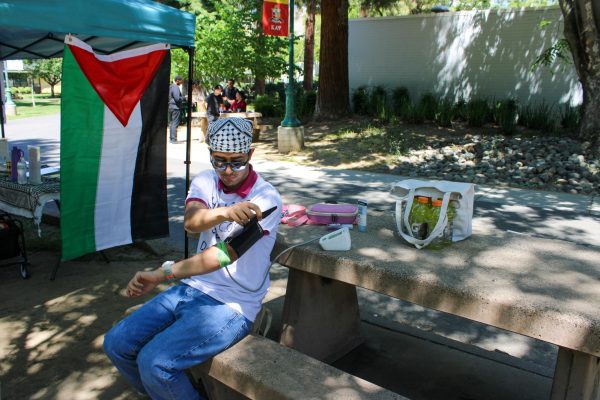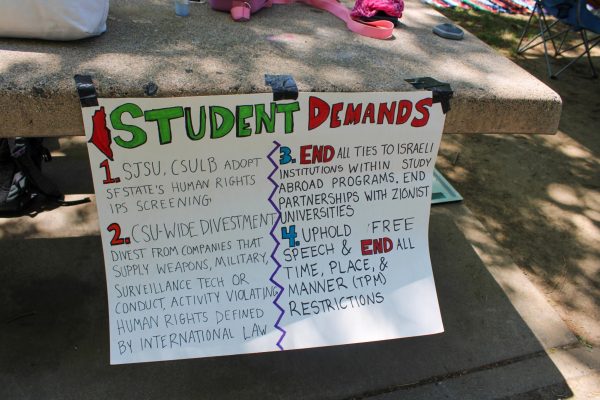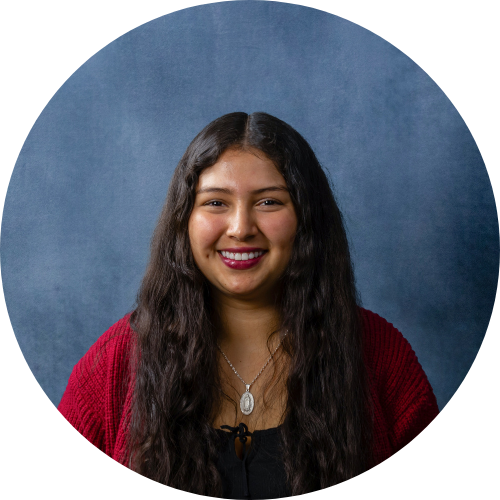Editor’s note: The last names of certain sources have been kept anonymous for the sake of minimizing harm and protecting their safety.
Students at Sacramento State launched a united hunger strike Monday, May 5 in solidarity with the millions of people in Palestine who are facing starvation. The strikers, coordinated by Sac State’s Students for Justice in Palestine, were standing alongside five other California State University schools: CSU Long Beach, CSU Dominguez Hills, CSU East Bay, San Jose State and San Francisco State.
The strikers had four demands of the entire CSU system: fully divest from companies that are complicit in the humanitarian crisis; abolish the current time, place and manner policy; cut financial ties to Israeli institutions; and adaptation of the SF State’s human rights investment policy.
The disassociation from Israeli institutions refers to strikers’ calls to move away from study abroad programs and university partnerships, such as Sac State’s study abroad program to University of Haifa in Israel.
Medical workers from the Healthcare Workers for Palestine in Sacramento collective are checking up on the strikers twice a day and keeping in communication with them. SPJ said one striker was taken to the Student Health, Counseling and Wellness center at The WELL due to their participation in the strike.
Junior political science major identified as Daniel said he had to stop on the fourth day of striking due to becoming hypoglycemic and having low blood pressure. He said that the decision to stop striking was difficult to make.
“I woke up that morning and both my feet were tingling, like they had been numb,” Daniel said.
The five initial Sac State strikers were tabling in the library quad throughout the week. According to SJP, over 25 students across the CSU system joined the strike.

“I’m Palestinian myself. These people are literally my blood,” Samira, a third-year psychology major who is partaking in the hunger strike said. “I’m struggling now, but that’s their life. I have the option to get something if I need it, but they don’t.”
The famine in Palestine has been criticized by the international community, as humanitarian aid trucks containing food have been denied entry into the Gaza Strip for two months.
Amal Dawud, an SPJ board member as well as a junior political science and journalism major, said that the motivation behind starting a hunger strike was to remind people that the conflict in Palestine is still ongoing.
“There’s food on one side of the border that Israel is not allowing in, so Gaza is starving, and it’s a condition that Israel created for them,” Dawud said. “2 million people are at risk of dying of starvation, while the answer is right outside of the border.”
RELATED: Pro-Palestine encampment draws support from students and community members at Sac State
Mansoor Jones, a third-year criminal justice major, said that this has become a humanitarian crisis.
Mansoor joined the initiative later on but said that the community made him feel extremely welcome.
“I really resonate with their cause. I’ve been very outspoken for a while about this stuff,” Jones said. “It’s nice to be somewhere on campus and be able to have a group to talk about this stuff with.”

Dawud said that the roadblock to CSU divestment has been interference from CSU Chancellor Mildred García following last year’s encampment and the current hunger strike.
“The chancellor is actively stepping in to make sure that our presidents don’t contribute to this effort,” Dawud said. “She’s putting roadblocks up, refusing to let them make comments, refusing to let them move forward on divestment or even move forward on divestment conversations.”
Dawud said she believes SPJ will eventually get CSU divestment, but she is aware that it will be a long fight. She said the chancellor sent out an announcement about the hunger strikes, stating that the CSU system will not alter its investment policies.
“We know exactly who is stopping us from that demand for her own benefit,” Dawud said. “If us hunger striking here isn’t enough for her to make a change, then I don’t think she’s the one who needs to be leading us.”
When reached out for comment, the Chancellor’s Office responded with the following email statement:
“We respect the diverse beliefs and personal convictions of our students, including those who have chosen to participate in a hunger strike. At the same time, we strongly urge our students to consider forms of expression that do not jeopardize their health and well-being. The safety and well-being of our students are of the utmost importance and remain the priority even, and especially, in times of unrest. While the CSU and its 23 universities honor the right to protest and the diverse convictions expressed across our campuses, the CSU will not be altering its investment policies. We will continue to uphold the values of free inquiry, peaceful protest, and academic freedom—while keeping student health, safety, and our mission at the forefront of all we do.”
In the spring 2024 semester, Sacramento State became the first CSU to promise divestment, amidst the movement of pro-Palestine encampments across the nation in 2024. Since that initial promise from President Luke Wood, Dawud said schools like Sac State have been cautious of the language they use when creating these policies, such as avoiding mention of Palestine or Israel.
RELATED: BREAKING: Sac State to alter investment policies in light of pro-Palestine encampment
“We definitely had to be behind them a lot and keep following up with them,” Dawud said. “There was a lot of pushback from the investment committees and the financial committees: people not willing to be part of divestment and having to step back and create roadblocks from the process, which made it take longer.”
Although Daniel has stopped striking, he said he is still holding out hope for a response.
“This is the first step. We’re not going to stop,” Daniel said. “Things are going to get so much worse for them if they don’t listen to us.”


































































































































